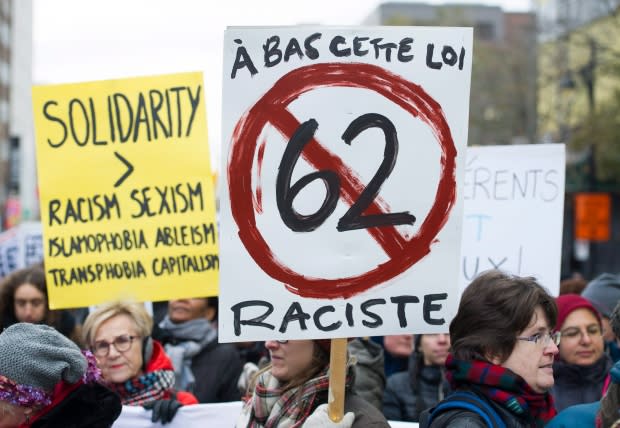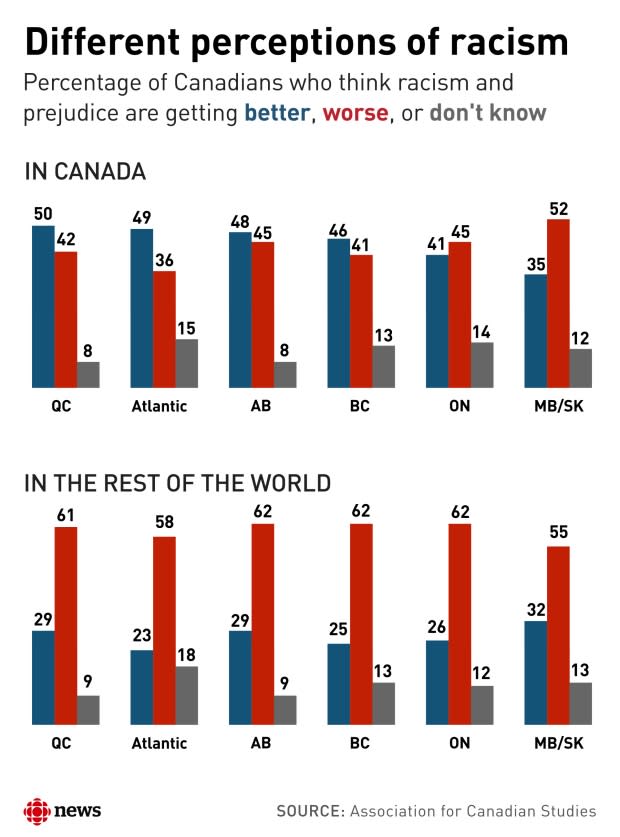Quebecers among Canadians most likely to believe racism is decreasing
Canadians think racism is on the rise in the world but not here, a new survey shows — and Quebecers are among those with the rosiest view of the degree of racism in Canada.
When asked if they think the degree of racism is getting better or worse in the country, half of Quebecers said it's getting better.
In Atlantic Canada, nearly as many — 49 per cent of those surveyed — said the degree of racism is getting better. That figure was 48 per cent in Alberta and 46 per cent in B.C.
People in Manitoba and Saskatchewan had the opposite view: more than half said the degree of racism is getting worse in Canada, and a similar proportion thought the same about what's happening in other countries.

The survey of 1,503 Canadians, which included 403 Quebecers, was conducted by Leger Marketing for the Association of Canadian Studies. It has a margin of error of 3.5 points, 19 times out of 20.
Touchy subject in Quebec: Jedwab
What explains this regional divide?
Demographer Jack Jedwab, the vice-president of the Association for Canadian Studies, suggests simply talking about racism is a touchy issue in Quebec.
"In Quebec, we saw considerable resistance to the very idea of having a consultation about systemic racism," Jedwab said, out of concern that it might give rise to "Quebec bashing."
The consultation was scuttled by the previous Liberal government after considerable outcry from critics and the opposition.
On the Prairies, Jedwab noted, there has been a more open discussion around issues of racial discrimination.
"In Manitoba and Saskatchewan, Indigenous issues and high Indigenous poverty have influenced perceptions about racism over the past few decades."
Perceptions don't match statistics
Sixty per cent of Canadians surveyed said they believe racism is on the rise worldwide, compared to 43 per cent who believe it's a growing problem in Canada.
Moses Gashirabake, a spokesperson for the Canadian Race Relations Foundation, cautioned that further study is needed to accurately measure Canadians' attitudes.
Canadians' belief that there is a lessening degree of racism flies in the face of what data suggests.
Hate crimes reported to police rose steadily between 2013 and 2016, the latest numbers available, according to Statistics Canada.
The Jewish organization B'nai Brith Canada, which has tracked anti-Semitic incidents since 1982, said 2017 was the second-straight record-breaking year for such incidents, mostly harassment and vandalism.
It seems that every week we hear of a swastika graffiti or someone spray-painting 'Hitler was right,'" said Daniel Koren, a spokeperson for B'nai Brith.
Anecdotal evidence from sociologists, historians and minority community leaders contacted by CBC News also suggests that racist speech, especially on social media, is on the increase.
"People are becoming more emboldened to behave in a racist way, thinking there are no consequences," said Marva Wisdom, a diversity consultant in Guelph, Ont. and a director of the Black Experience Project, a large study of black Canadians in the greater Toronto area.
"There aren't enough people pushing back."
"There is no doubt that there is a rise in racist rhetoric in Canada that mirrors the rest of North America and Europe," said Barrington Walker, a professor of black Canadian history at Queen's University.
The survey didn't ask people for their race or immigration status. Walker suspects that those who think the degree of racism is getting better are probably white Canadians of Anglo-Saxon stock, who may not be targets of prejudice.
"We have an entrenchment of racialized poverty. In big urban centres, we're seeing see pockets of poverty by marginalized groups."
However, he said, living next to the U.S., which is going through a particularly challenging time when it comes to race relations, might make Canadians think that here isn't so bad.
Social media warps perception
B'nai Brith's Koren blames social media for some of the rise in racist acts and rhetoric.
These unfiltered platforms amplify voices that were once on the fringes, bringing them to the attention of the mainstream.
"They're hotbeds of racism and discrimination," he said.

The ACS survey found that people who use Twitter regularly had a more optimistic view of the degree of racism than those who don't, regardless of age group.
Forty-seven per cent of regular Twitter users said racism is on the rise, compared to 66 per cent of non-users.
Jedwab said he believes that the common racist rhetoric on these platforms might be desensitizing users of social media to it.
"Whether it is anti-Semitism or other forms of prejudice, there is a higher degree of its visible expression in social media, and the filters for blocking such expression in traditional print media are no longer there," he said.
Older Canadians more pessimistic
When broken down by age, the differences become sharper.
Fifty-five per cent of Canadians 65 years or older said racism is getting worse, compared to 26 per cent of those 18 to 24 years of age.
Jedwab believes this generation gap can be explained by the simple fact that young people haven't encountered prejudice as often as someone of advanced years.
Either that, he said, "or they have less exposure and do not identify it or name it as readily."
Younger Canadians are also more likely to have a diverse group of friends, especially in city schools, said Lori Wilkinson, a professor of sociology at the University of Manitoba who teaches race relations. This might make lead them to think racism isn't a problem.
However, Walker also sees a backlash among young people in what is perceived as excessive political correctness.
"I see a pushback against policing speech. There's a feeling that their rights are being curtailed," he said.
For more on the survey's results, see below:

